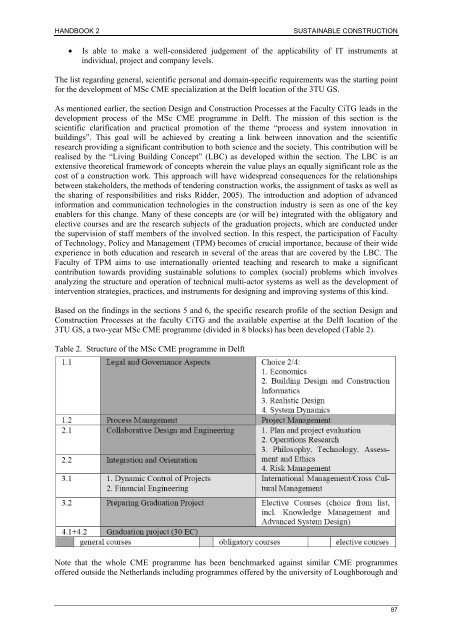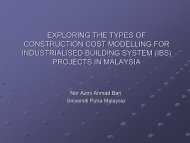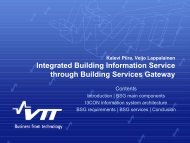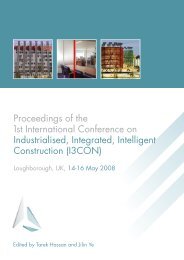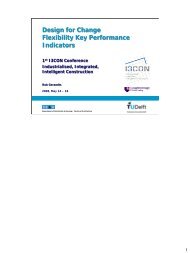Industrialised, Integrated, Intelligent sustainable Construction - I3con
Industrialised, Integrated, Intelligent sustainable Construction - I3con
Industrialised, Integrated, Intelligent sustainable Construction - I3con
You also want an ePaper? Increase the reach of your titles
YUMPU automatically turns print PDFs into web optimized ePapers that Google loves.
HANDBOOK 2 SUSTAINABLE CONSTRUCTION<br />
• Is able to make a well-considered judgement of the applicability of IT instruments at<br />
individual, project and company levels.<br />
The list regarding general, scientific personal and domain-specific requirements was the starting point<br />
for the development of MSc CME specialization at the Delft location of the 3TU GS.<br />
As mentioned earlier, the section Design and <strong>Construction</strong> Processes at the Faculty CiTG leads in the<br />
development process of the MSc CME programme in Delft. The mission of this section is the<br />
scientific clarification and practical promotion of the theme “process and system innovation in<br />
buildings”. This goal will be achieved by creating a link between innovation and the scientific<br />
research providing a significant contribution to both science and the society. This contribution will be<br />
realised by the “Living Building Concept” (LBC) as developed within the section. The LBC is an<br />
extensive theoretical framework of concepts wherein the value plays an equally significant role as the<br />
cost of a construction work. This approach will have widespread consequences for the relationships<br />
between stakeholders, the methods of tendering construction works, the assignment of tasks as well as<br />
the sharing of responsibilities and risks Ridder, 2005). The introduction and adoption of advanced<br />
information and communication technologies in the construction industry is seen as one of the key<br />
enablers for this change. Many of these concepts are (or will be) integrated with the obligatory and<br />
elective courses and are the research subjects of the graduation projects, which are conducted under<br />
the supervision of staff members of the involved section. In this respect, the participation of Faculty<br />
of Technology, Policy and Management (TPM) becomes of crucial importance, because of their wide<br />
experience in both education and research in several of the areas that are covered by the LBC. The<br />
Faculty of TPM aims to use internationally oriented teaching and research to make a significant<br />
contribution towards providing <strong>sustainable</strong> solutions to complex (social) problems which involves<br />
analyzing the structure and operation of technical multi-actor systems as well as the development of<br />
intervention strategies, practices, and instruments for designing and improving systems of this kind.<br />
Based on the findings in the sections 5 and 6, the specific research profile of the section Design and<br />
<strong>Construction</strong> Processes at the faculty CiTG and the available expertise at the Delft location of the<br />
3TU GS, a two-year MSc CME programme (divided in 8 blocks) has been developed (Table 2).<br />
Table 2. Structure of the MSc CME programme in Delft<br />
Note that the whole CME programme has been benchmarked against similar CME programmes<br />
offered outside the Netherlands including programmes offered by the university of Loughborough and<br />
87


